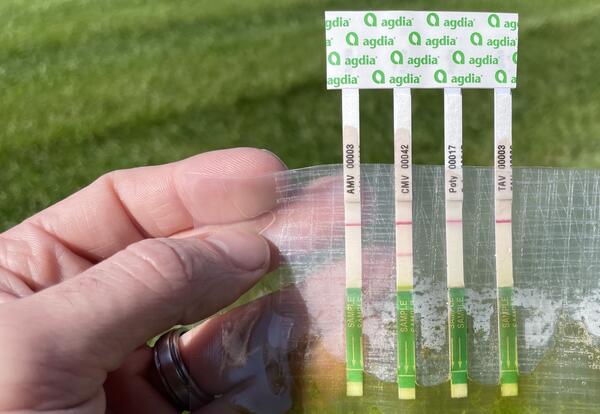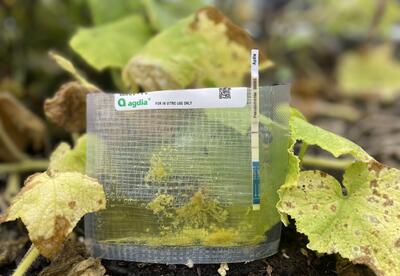
Figure 1. The new Aphid Mosaic Viruses ImmunoComb® for convenient detection of AMV, CMV, Potyviruses & TAV, showing results for a CMV-positive sample.
Agdia, Inc. is happy to announce the addition of a new product to their ImmunoComb® line to help growers detect and combat plant viruses that cause similar symptoms in addition to sharing a common insect vector. The new Aphid Mosaic Viruses ImmunoComb® brings together four existing ImmunoStrips® in one easy-to-use format.
Common symptoms require accurate testing for diagnosis
Alfalfa mosaic virus (AMV), Cucumber mosaic virus (CMV), Potyviruses and Tomato aspermy virus (TAV) are all commonly spread by aphids (Order Hemiptera) and can cause similar mosaic symptoms on many plant species. Such visual similarities in the presence of a common vector underscore the unreliability of visually identifying the causal pathogen, further emphasizing the need for reliable and easy-to-use onsite diagnostic test methods.
Alfalfa mosaic virus (AMV)
Alfalfa mosiac virus (AMV) is the type member and singular species within the Alfamovirus genus. Symptomology was first described in 1931 on alfalfa plants (Medicago sativa) in California, and AMV is now confirmed to infect more than 600 species of plants, causing significant crop losses in many. Hosts include many economically important species within Amaranthaceae, Asteraceae, Fabaceae, Lamiaceae and Solanaceae, in addition to several weedy species common in regions of intensive agriculture and horticulture. This virus is now widespread throughout Africa, Asia, Europe, North America, Oceania and South America. In recent years it can be commonly found in a variety of legumes (beans, alfalfa), vegetables (potato, pepper, spinach, etc), and any number of ornamental crops.
Aphids are the most important method of local AMV transmission in many crops. In addition to aphid vectors, AMV can be spread via mechanical transmission, dispersion of infected pollen and movement of infected seed. Nevertheless, AMV is not seed-transmitted in all hosts, and localized outbreaks are typically the result of a combination of dispersal paradigms. Therefore, these epidemics are difficult to predict, and management is multi-faceted. Long-distance dispersal of AMV occurs via the interstate movement of infected propagative materials. Diagnostic screening of all propagative materials, including seeds, cuttings and tissue culture products, is the most effective method for limiting the movement of AMV over long distances.
Agdia’s Immunostrip® for Alfalfa mosaic virus was screened against a diverse group of isolates in Subgroups I and II from several geographic locations. When tested against a board panel of other viruses for specificity, no cross reactivity was observed. This assay was developed to be used with leaf tissue for all hosts and was validated for use on alfalfa, pepper, soybean and tomato seeds.
Cucumber mosaic virus (CMV)
Cucumber mosaic virus (CMV) is a plant pathogenic virus in the genus Cucumovirus (Bromoviridae family). First described in cucumbers in the early 1900s, Cucumber mosaic virus is known to infect over 1200 species of plants across the globe. It causes significant losses in many economically-important vegetable and ornamental crops (cut flower, bedding, perennial), and nearly all cucurbit varieties are considered susceptible to infection. Other important crops of note which can be infected by CMV include tomatoes, peppers, banana, celery, spinach, narcissus, beans, spinach & woody plant species. In addition to mosaic patterns, common symptoms caused by Cucumber mosaic virus include mottling, leaf deformation, ringspots, general chlorosis (yellowing) and stunting. Symptoms can also be found on certain fruits, such as ringspots on peppers, causing them to be unmarketable. It has been noted that more than 80 species of aphids may be able to transmit Cucumber mosaic virus (source).
Agdia’s ImmunoStrip® for Cucumber mosaic virus has been validated on over 140 different CMV isolates from around the world with no known cross-reactions with other viruses.
Potyviruses
Potyviruses are among the largest groups of plant pathogens and affect hundreds of crop species. Viruses within the Potyvirus genus (family Potyviridae) are transmitted through one or more of the following means: aphid, seed, mechanical, graft and pollen. Potyviruses can cause a wide range of symptoms and have a significant impact on crop production including loss of yield, unmarketable product and regulatory impacts.
More than 200 Potyvirus species are vectored locally by several species of aphids in a non-persistent, non-circulative manner. Infection is not limited to a specific plant tissue. Like other viruses transmitted in this manner, Potyvirus transmission efficacy is short-lived in the aphid vector, but efficient, nevertheless. High rates of infection are common within and between fields when aphid populations proliferate. Aphid vectors acquire the virus within seconds through stylet probes of plant tissue. Virions are localized for transmission within the aphid’s stylet where they are bound to the wall of the feeding apparatus via a viral-encoded protein. Soon after virus acquisition, aphids must emigrate from infected plants and feed on healthy plants for horizontal Potyvirus transmission to occur.
Among many others, the most well-known and impactful species of the Potyvirus genus includes Potato virus Y (PVY, the Potyvirus type species) Plum pox virus (PPV), Watermelon mosaic virus (WMV), Papaya ringspot virus (PRSV), Turnip mosaic virus (TuMV), Tobacco etch virus (TEV), Bean yellow mosaic virus (BYMV), Lettuce mosaic virus (LMV) and Leek yellow stripe virus (LYSV).
Agdia's Potyvirus Group ImmunoStrip allows users to detect over 20 Potyvirus species in more than 70 of the most important crops they infect.
Tomato aspermy virus (TAV)
Tomato aspermy virus (TAV) is a member of the Cucumovirus genus and infects a wide range of economically important hosts, including canna, chrysanthemum, several species of Lilium, pepper, tobacco and tomato. This virus was first described in 1949 infecting tomato, causing severe leaf distortion and seedless fruit.
Tomato aspermy virus is widespread in cultivated chrysanthemums, and outbreaks are common throughout regions where they are grown extensively, including Asia, Australia, Europe, New Zealand and North America.
Symptomology of TAV infection on chrysanthemum varies by cultivar but typically includes plant stunting, chlorotic leaf mottling and severe flower break, dwarfing and distortion. These symptoms lead to reduction in yield and render plants unmarketable for floral and landscape purposes. Furthermore, many cultivars are asymptomatic, functioning as latent reservoirs of infected propagative materials.
Tomato aspermy virus is spread locally in fields and greenhouses by several species of aphids. It is spread in a non-persistent manner, meaning the virus can be acquired from an infected plant via feeding within seconds of stylet insertion.
Agdia's ImmunoStrip® for Tomato aspermy virus was evaluated against a diverse panel of TAV isolates from multiple geographic regions, including Asia, Europe and North America.
Simplifying diagnosis so you can take action faster
The Aphid Mosaic Viruses ImmunoComb® for AMV, CMV, Potyviruses & TAV allows growers to conveniently and simultaneously detect or rule out infections of each virus in a single sample. This product is sold in kits of 8 combs consisting of 4 ImmunoStrips® each, and the buffer-filled extraction bags necessary to perform a test. Agdia provides a one-year warranty on all purchased products along with an unrivaled level of customer support.
About Agdia
A leading provider of diagnostic solutions for agriculture, Agdia, Inc. has been serving plant breeders, propagators, growers, universities, and private testing laboratories since 1981. The company offers a comprehensive portfolio of validated, easy-to-use diagnostics for identifying plant pathogens, hormones, and transgenic traits. In addition, Agdia operates an ISO accredited, in-house, testing services laboratory. Agdia’s quality management system is ISO 9001:2015 certified and their Testing Services Laboratory is ISO/IEC 17025:2017 accredited by ANAB. Visit the company’s website at www.agdia.com, e-mail info@agdia.com, phone 1-574-264-2615 (toll-free 800-622-4342) or fax 1-574-264-2153.
ImmunoStrip® and ImmunoComb® are registered trademarks of Agdia, Inc.





